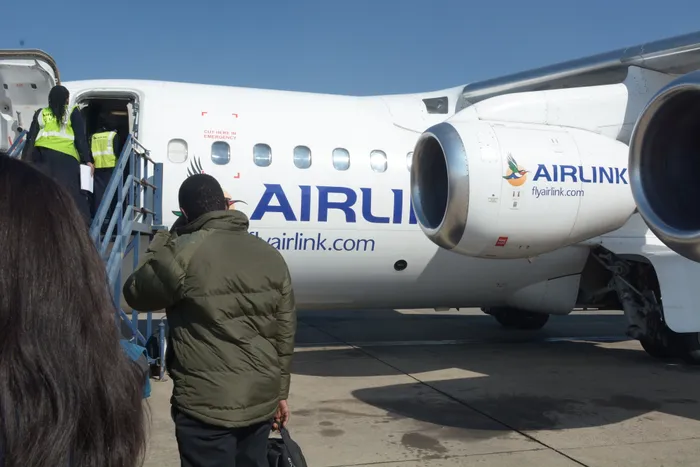Competition Commission accuses Airlink of aggressive behavior against Fly Blue Crane
AVIATION

The airline cited an operating loss of R12 million outside the disputed period, service suspensions between 2019 and 2022, and long-standing infrastructure issues at Mthatha Airport, including unreliable electricity, limited fuel storage and inadequate runway lighting.
Image: File picture
The Competition Commission has accused regional airline Airlink of aggressive and exclusionary conduct on the Johannesburg–Mthatha route, alleging that its pricing strategy between 2012 and 2016 forced rival Fly Blue Crane (FBC) out of the market and cost consumers more than R100 million in inflated fares.
In the ongoing hearing at the Competition Tribunal, economist Jason Aproskie argued that Airlink had demonstrated its ability to sustain prolonged losses to keep competitors at bay.
He pointed to the Johannesburg–Namibia route, where Airlink recorded losses for 35 out of 36 months, as evidence of its capacity to remain in unprofitable markets in order to outlast rivals.
"Which shows its ability to sort of remain in that territory. If it was engaging in this conduct against a more efficient operator, it shows that it can sustain losses for a long period of time," Apriskie said.
He added that FBC’s decision to set low fares to gain market share did not make it responsible for its exit, suggesting instead that Airlink’s behaviour made survival on the route impossible.
"We have to ask why their prices were low. It's clear that the entrant set prices lower to gain market share."
However, Airlink has strongly rejected the claims, arguing that the Mthatha route was never consistently profitable.
The airline cited an operating loss of R12 million outside the disputed period, service suspensions between 2019 and 2022, and long-standing infrastructure issues at Mthatha Airport, including unreliable electricity, limited fuel storage and inadequate runway lighting.
Economic expert Anthony Felet told the Tribunal that global shocks - from the 2008 financial crisis to the COVID-19 pandemic - had further strained the airline, forcing debt restructuring and shareholder contributions of R100m to maintain operations.
Felet said that rebuilding the route after the pandemic required Airlink to absorb R28m in losses, demonstrating a long-term commitment rather than short-term profit-seeking.
While the airline earned R104m in operating profits during the complaint period, it argued that fare increases averaging about 6% annually reflected market conditions, not anti-competitive intent.
"There are the capacity factors, it's a function of the fares charged by FBC. There's no reason why FBC over time - had it maintained its ability to operate on the route and had sufficient funding to do so - could have achieved the same load factors with the appropriate aircraft and also with high revenue yields as it develops confidence in the market and improved its operating performance," Felet said.
"The fact is that it exited the market due to circumstances that had nothing to do with Airlink's conduct."
Felet also dismissed the notion that Airlink could have created some headroom in the market for the new entrant.
"The point was with regard to a higher cost entrant, not just a general entrant. The point was about the feasibility of forcing incumbent airlines to accommodate higher costs. It is not realistic or practical," he said.
The Commission’s investigation initially found that Airlink allegedly abused its dominance from September 2012 to August 2016, causing consumers to overpay by more than R100m over five years on the route.
The Commission charged that Airlink's pricing had contributed to the exit of Fly Blue Crane.
If found guilty, Airlink could face administrative penalties of up to 10% of its annual turnover and orders to adjust its pricing practices.
Observers say the outcome could set a precedent for pricing regulation on South Africa’s domestic air routes, particularly in underserved regions like the Eastern Cape province.
BUSINESS REPORT